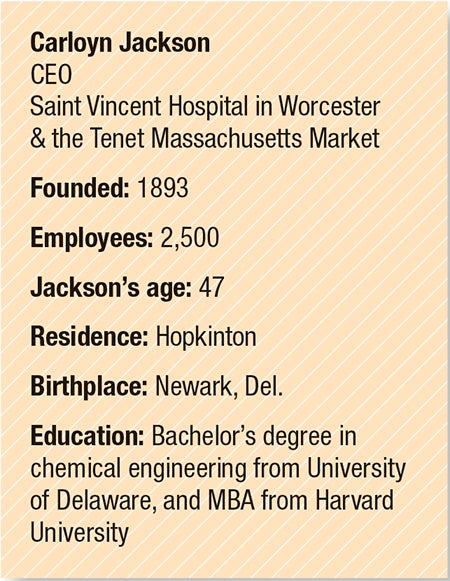CEO Carolyn Jackson, who was often personally the target of the union members’ frustration, is now tasked with repairing the hospital’s culture.
Get Instant Access to This Article
Subscribe to Worcester Business Journal and get immediate access to all of our subscriber-only content and much more.
- Critical Central Massachusetts business news updated daily.
- Immediate access to all subscriber-only content on our website.
- Bi-weekly print or digital editions of our award-winning publication.
- Special bonus issues like the WBJ Book of Lists.
- Exclusive ticket prize draws for our in-person events.
Click here to purchase a paywall bypass link for this article.
On Jan. 3, members of the Massachusetts Nurses Association union voted to end their 301-day strike at Saint Vincent Hospital, the longest nurses strike in the state’s history, which at the beginning included 800 nurses. Hospital CEO Carolyn Jackson, who represented management during the strike and was often personally the target of the union members’ frustration, is now tasked with repairing the hospital's working culture, as the entire healthcare industry is still reeling from the COVID pandemic.

Why did the strike end?
The strike ended because we were able to reach an agreement on the new collective bargaining agreement and a new back-to-work agreement. Both parties agreed the strike had stretched on too long, especially in light of the pandemic and a labor shortage in our industry.
U.S. Labor Secretary Marty Walsh joined the negotiations near the end. How did he help bring a resolution?
I never actually talked to him, but he had reached out to both parties about helping us reach a resolution. Both parties agreed to him joining the conversation on Dec. 17, and he was certainly helpful in bringing us to a common ground. His only formal involvement was on Dec. 17.
The final agreement between the union and the hospital seems remarkably similar to the deal on the table in August, which addressed the main concerns over patient-to-nurse staffing ratios and salaries. Did anything materially change between August and December?
The collective bargaining agreement had two minor modifications from August. The first was over a bonus payment for all nurses at the hospital. The second was the end date of the agreement, which is now Dec. 31, 2025, instead of Dec. 31, 2024. Thankfully, we don’t have to negotiate again for quite awhile.
After August, the return-to-work agreement was the final sticking point. [Editor’s note: This was resolved by the hospital allowing the striking union nurses to return to their previous positions while the nurses hired as their replacements during the strike were allowed to stay in their jobs as well.]
Are you pleased with the final agreement?
I am definitely pleased the strike is over, and that nurses are going back to patients’ bedsides. Both sides learned a lot over the last nine months.
Was the strike difficult on you?
It was difficult driving through the picket line every day, but those providers who were working in the hospital did a great job, including the union nurses who crossed the picket line, the traveling nurses we brought on, and all the other providers at the hospital. We had great reviews from patients. That provided me with joy.
Week-after-week, though, it started getting more difficult, as we kept thinking the strike would end in a few weeks. After a while, we stopped thinking it was going to end soon and decided to just start working on the future of Saint Vincent.
Much of the anti-Saint Vincent language from the union was directed at you by name, and several handmade signs were posted around Greater Worcester attacking you personally. Was it difficult to see all the anti-Carolyn Jackson verbiage?
In a role like mine, you have to have a thick skin. All that was challenging at times, but I was always encouraged by the support I got from the community. Patients would stop me in the halls to say what great experiences they were having. Even out and about in the community, people would tell me they saw me on television, and they supported me.
Those signs and everything were difficult, but you realize it is just words.
Where do you go from here?
Saint Vincent has always enjoyed the position in the Worcester market as the high-quality, low-cost provider. Where we would like to go next is to be the dream provider, which is to add high efficiency. Providing the right care in the right place at the right time is important in health care.
We are looking forward to being that place, where it is easy to get an appointment, your test results are on time, the providers you need are easy to find, and all of that is encompassed by great customer service.
What role will the nurses have in that goal?
One of the challenges during the strike has been the travel nurses. We’ve had 200+ travel nurses since the beginning of the strike. They were great, but most were only here for two to three weeks. It is tough to launch new initiatives with a constantly changing workforce.
With the union nurses coming back by Jan. 22, we can begin to implement those initiatives.
How do you start?
The one key in the future is focusing on culture, especially after the striking nurses return. At that point, we’ll have the returning union nurses working alongside those union members who crossed the picket line and the non-union nurses we hired as replacements. We need to set a behavioral norm throughout the hospital. We are going to have everyone sign a document expressing commitment to their colleagues, which will outline how we will work in a collaborative, collective manner.
We have a lot of healing to do. Some things have been written and said that were hurtful, both from the nurses side and vice versa. You can’t have that in a tense healthcare environment, so we quickly need to get people functioning back to a level they were before the strike. We won’t really know how it will be until the nurses come back.
This interview was conducted and edited for length and clarity by WBJ Editor Brad Kane.

